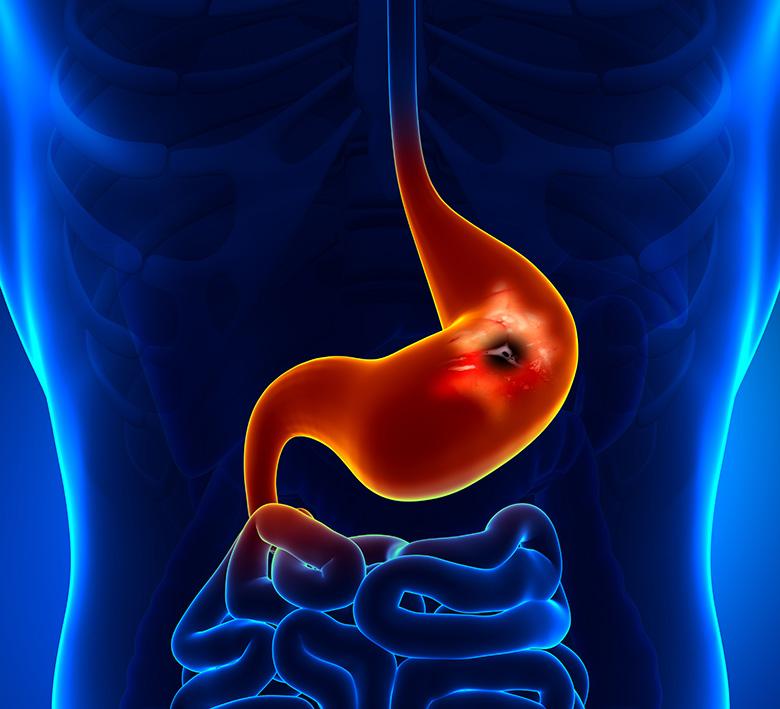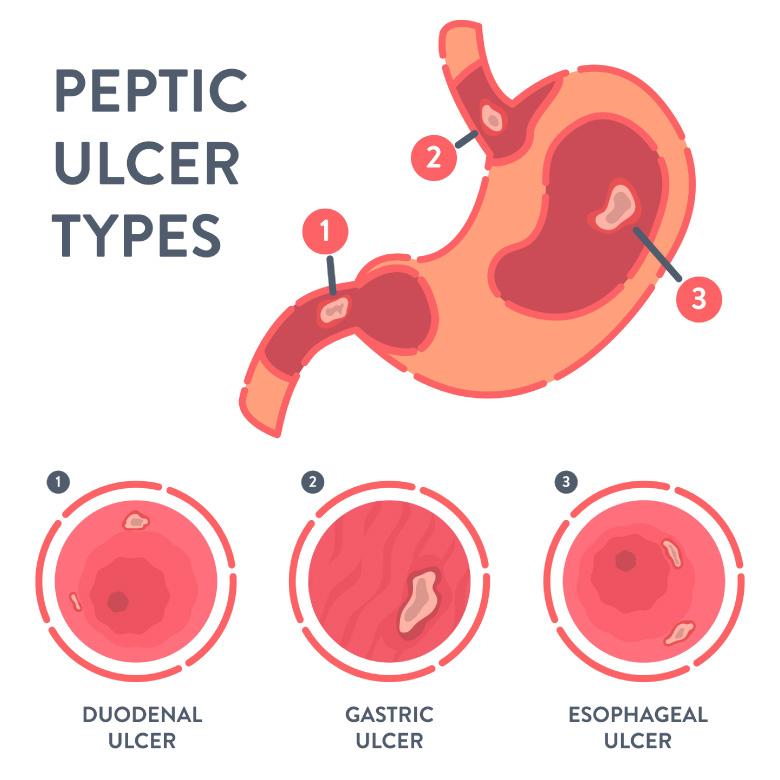Peptic Ulcers
What are peptic ulcers?
Peptic ulcers are open sores that can be found in the:
- Stomach lining
- First part of the small intestine (the duodenum)
These painful sores develop when the acidic digestive fluids in the stomach eat away the protective lining of the organs, thus forming ulcers.
Left untreated, peptic ulcers can lead to serious complications including bleeding in the stomach and perforation (tear) of the stomach wall.
Types of peptic ulcers
Peptic ulcers are named according to where they occur:
- Duodenal ulcers develop on the inside of the upper part of the small intestine, known as the duodenum. It is the most common type of peptic ulcer.
- Gastric ulcers develop on the inner lining of the stomach.
What are the symptoms of peptic ulcers?
Depending on the severity of your peptic ulcer, you may experience:
Dull or burning pain in the stomach
The most common symptom of peptic ulcers is a dull or burning pain in the stomach. This is often felt in the upper abdomen, anywhere between the navel and breastbone. You can identify the pain through the following characteristics:
- Lasts for minutes to hours.
- Happens on and off for several days, weeks, or months.
- Happens when the stomach is empty (e.g. between meals). Pain from duodenal ulcers tends to happen at night.
- Stops briefly when a meal or an antacid is taken. Pain relief is better in duodenal ulcers than in gastric ulcers.
Other symptoms
You may also experience the following symptoms:
- Heartburn
- Changes in appetite
- Bloating and belching
- Black stools, which is a sign of bleeding
- Trouble breathing and feeling faint
- Unexplained weight loss
- Nausea and vomiting
- Vomiting of blood
What causes peptic ulcers?
The most common causes of peptic ulcers include:
- Helicobacter pylori (H. pylori) infection. Found in the stomach of many people, H. pylori bacteria can break down the protective mucous coating on the stomach and duodenum lining. This breakdown allows stomach acid to reach the stomach and the duodenum lining, causing the formation of peptic ulcers.
- Non-steroidal anti-inflammatory drugs (NSAIDs). NSAIDs block or reduce an enzyme in the body that promotes pain and fever. However, this enzyme also protects the stomach lining from stomach acid. Long-term use of NSAIDs (such as aspirin and ibuprofen) can damage the stomach lining and increase the chances of developing peptic ulcers.
- Smoking. Smoking increases the risk of developing stomach ulcers. It also makes treatment less effective and increases the likelihood of the ulcers recurring.
- Alcohol. Excessive consumption of alcohol increases stomach acid production and may cause peptic ulcers.
What are the complications and related diseases of peptic ulcers?
The most common complications of peptic ulcers are bleeding and perforation of the stomach or duodenum wall.
- Bleeding occurs when blood vessels are damaged due to the presence of ulcers, and may be deadly in the elderly or those with multiple medical problems. Bleeding is more common among those who take blood-thinning agents.
- Perforation of the stomach or duodenum wall occurs when a severe, untreated ulcer makes a hole that allows digestive juices and food to leak into the abdominal cavity. Immediate surgery is usually required to treat this condition.
- Blockage of the duodenum opening may occur due to the swelling or scarring of ulcers located where the duodenum joins the stomach. This blockage prevents food from leaving the stomach and entering the small intestine, resulting in vomiting and an inability to eat.
How do you prevent peptic ulcers?
To prevent peptic ulcers:
- Avoid taking NSAIDs for prolonged periods or at high doses.
- If you need to take NSAIDs for a long time or at high doses, take additional medicines to protect your stomach and duodenum, such as antacids or proton pump inhibitors.
- Stop smoking and limit alcohol consumption to small amounts of dilute alcohol.
- Protect yourself from H. pylori infections by washing your hands frequently with soap and water, and by avoiding foods that are not fully cooked.









